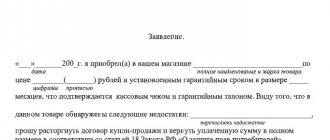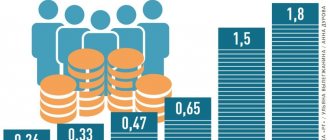Home / Complaints, courts, consumer rights / Consumer rights
Back
Published: 10/10/2018
Reading time: 4 min
0
773
Very often, disagreements arise between customers and store employees regarding photography on the sales floor. To do this, you need to turn to the Constitution of the Russian Federation, in particular, to paragraph 4 of Article 29, which regulates the right of every citizen to freely seek, produce, transmit or disseminate information in any legal way. Paragraph 1 of Article 8 of Federal Law No. 149 “On Information, Information Technologies and Information Protection” also states that individuals and legal entities have the right to seek and receive information in any form and from any source, subject to the requirements of this Federal Law.
- Is photography allowed in the store? Photographing products and price tags
- What is prohibited from filming
Paragraph 1 of Article 9 of Federal Law No. 149 states that access to information can be limited only on the basis of federal law in order to protect the health, morals, rights and interests of other persons. In the absence of a legal ban on photography, no local government has the right to set its own rules and prohibit photography on the territory of the store.
It is important to note that the interior of the store, the goods on the shelves and price tags are publicly available information. According to paragraph 1 of Article 7FZ No. 149, publicly available information is information to which access is unlimited. In most stores, entry is free, and products and their price tags are visible to everyone. Paragraph 2 of Article 7 of Federal Law No. 149 regulates the use by all citizens of publicly available information at their discretion, subject to the restrictions of the Federal Law in relation to this information.
Photography and videography: laws and regulations
Let us immediately note that there is no direct ban on photography on store premises in the current legislation. However, there are a number of legislative acts that allow this to be done. For example:
- The Constitution of the Russian Federation, Article 29, paragraph 5 - gives citizens the right to receive, search and transmit information in any way, with the exception of information that is classified as a state secret;
- Code of Administrative Offenses of the Russian Federation, Article 14.9 - gives the consumer the right to receive information about the product, manufacturer, seller and store operations; violation of this right entails administrative liability;
- Federal Law No. 149-FZ, Article 7 - defines the concept of publicly available information;
- Federal Law No. 149-FZ Art. 5 - indicates that information that is a public object of legal relations can be freely used and transmitted.
Of course, these legal acts do not provide direct permission to conduct video filming in a store. However, they guarantee citizens unhindered access to public information. It remains to be seen whether price tags and goods in the store fall under this definition.
Article 29 of the Constitution of the Russian Federation
Article 14.9 of the Code of Administrative Offenses of the Russian Federation “Restriction of competition by authorities, local governments”
Article 7 of the Federal Law of July 27, 2006 No. 149-FZ “Publicly Available Information”
Article 5 of the Federal Law of July 27, 2006 No. 149-FZ “Information as an object of legal relations”
To shoot or not
Restrictions on access to information are established by Art.
9 of Federal Law No. 149-FZ. In particular, citizens cannot receive information that affects the interests and rights of other persons, the country’s defense capability, or state security issues. For example, if a person takes pictures during a tour of a defense enterprise, he will be legally prohibited from doing so. Another example: a car accident victim is photographed in a hospital bed, thereby violating his right to privacy.
For natural reasons, access to information constituting a commercial or official secret is limited. However, shops and other retail outlets do not fall under any of the above criteria.
Important! The store administration usually explains the ban on filming by internal rules and local regulations. However, such acts must not contradict current legislation.
Article 9 of the Federal Law of July 27, 2006 No. 149-FZ “Restriction of access to information”
Can an employee shoot video on the employer's premises?
EAT. Taranenko, author of the answer, legal consultant at Askon
QUESTION
Is there a ban (restrictions) in the current legislation for an employee to conduct video filming with a video camera (mobile phone) on the employer’s territory? A worker is an employee of a store. Takes photographs during negotiations with the employer.
ANSWER
The legislation does not prohibit an employee from filming video on the employer’s territory. However, in order to ensure confidentiality and protect trade secrets, the employer has the right to independently establish such a prohibition for employees and reinforce it with local acts of the organization (for example, Internal Labor Regulations). Such local acts must be brought to the attention of all employees against signature. In this case, the employee filming the video may be subject to disciplinary action.
JUSTIFICATION
According to Art. 8 of the Labor Code of the Russian Federation, employers adopt local regulations containing labor law norms, within their competence in accordance with labor legislation and other regulatory legal acts containing labor law norms, collective agreements, and agreements. The norms of local regulations adopted by the employer should not worsen the situation of employees in comparison with established labor legislation and other regulations containing labor law norms, collective agreements, and agreements.
According to paragraph 1 of Art. 8 of the Federal Law “On Information, Information Technologies and Information Protection” dated July 27, 2006 N 149-FZ, citizens (individuals) and organizations (legal entities) have the right to search and receive any information in any forms and from any sources at subject to compliance with the requirements established by this Federal Law and other federal laws.
An exception is information with limited access - confidential, constituting a state, commercial, official or other secret (Article 9 of Law No. 149-FZ). By virtue of Part 5 of Art. 9 of Law N 149-FZ, information received by citizens (individuals) in the performance of their professional duties or organizations in the performance of certain types of activities (professional secrets) is subject to protection in cases where these persons are obligated by federal laws to maintain the confidentiality of such information . So, for example, relations related to the establishment, change and termination of the trade secret regime in relation to information that has actual or potential commercial value due to its unknown to third parties are regulated by Federal Law of July 29, 2004 N 98-FZ “On Trade Secrets” "
It should also be noted that, according to paragraph 1 of Article 152.1 of the Civil Code of the Russian Federation, the publication and further use of a citizen’s image (including his photograph, as well as video recordings or works of fine art in which he is depicted) are allowed only with the consent of this citizen. After the death of a citizen, his image can only be used with the consent of the children and surviving spouse, and in their absence, with the consent of the parents. Such consent is not required in cases where:
- 1) the use of the image is carried out in state, public or other public interests;
- 2) the image of a citizen was obtained during filming, which is carried out in places open to the public or at public events (meetings, conventions, conferences, concerts, performances, sporting competitions and similar events), except for cases where such an image is the main object use;
- 3) the citizen posed for a fee.
What can you shoot?
In most cases, a person removes goods or price tags in a store not out of idle interest: this is the best option to demonstrate the benefits of a product to loved ones, to compare the cost of similar products in different retail outlets.
Let's try to figure out what exactly can be filmed on the territory of the store and how legal the prohibitions put forward by the administration are.
Trademarks and copyrights
This is a rather interesting question: copyright is protected by law, and the administration of retail outlets classifies trademarks and logos as trade secrets.
However, there is one caveat: the law prohibits using a trademark without permission. In particular, if a person makes a copy of a famous brand and puts a print on sportswear, he is breaking the law and will be held accountable. However, photographing logos without the purpose of use is not prohibited by law. This also applies to copyright. The consent of copyright holders to reproduce and use works is required only in the following cases:
- copying designs of buildings and structures;
- reconstruction of computer programs and databases;
- reproduction of books and music in any way;
- recordings of public speeches and their subsequent playback on professional equipment.
It follows that photography and video shooting do not constitute a violation of copyright in goods offered for sale . Of course, if a person photographs a book page by page for subsequent reading or reprinting, the administration has the right to interrupt this action on legal grounds. The store has no right to prohibit taking photographs of the cover in order to share an interesting book with friends.
If there are people in the frame
In such cases, filming can be considered a violation of the right to privacy: Art. 152.1 of the Civil Code of the Russian Federation prohibits the publication or use of images of a citizen without his consent. An exception is made in cases where the filming was carried out:
- in places open to the public;
- for reward.
For the first case, it is important that the captured citizen is not the main object of the composition. The store is a public place, so visitors accidentally caught in the frame do not become the object of an offense.
Download for viewing and printing:
Article 152.1 of the Civil Code of the Russian Federation “Protection of the image of a citizen”
Is photography allowed in the store?
If disputes arise with store employees, it is worth remembering that taking photographs in the store is a legal action for the buyer to obtain the necessary information.
Any obstacle to photography by the administration of the trading floor is a direct violation of Federal Law No. 149 “On Information, Information Technologies and Information Protection” and the Constitution of the Russian Federation, in particular Article 29.
In addition, the placement of goods and the indication of their price, according to paragraph 2 of Article 437 of the Civil Code of the Russian Federation, are an invitation to enter into an agreement (in this case, a purchase and sale agreement), which is a public offer. How the buyer will use and obtain information for this is his personal business.
Photographing goods and price tags
As mentioned above, no one has the right to prohibit photography in the sales area of a store.
The buyer has the right to photograph goods, price tags, display cases, refrigerators, shelving and other items in the store . But very often store security guards prevent this, citing trade secrets.
According to Art. 3 Federal Law No. 98 “On Trade Secrets”, information that is a trade secret is information of any nature that has commercial value due to its unknown to outsiders, to which there is no free access and in respect of which a trade secret regime has been introduced. Thus, publicly available store information cannot in any way be a trade secret, and its use in the form of photography cannot be prohibited.
To take photographs in the sales area, the buyer does not need to obtain the consent of security guards, directors, salespeople, managers and other store employees.
The ban on photography by the store can be explained by the fact that very often secret shoppers and employees of competing organizations use the captured information not for personal information purposes, but for selfish purposes to gain profit. This action is classified as commercial espionage.
To stop such an action, a security guard or store employee has the right to call the police, but to prove it he must provide irrefutable facts of espionage. Otherwise, he faces the imposition of an administrative fine.
What is prohibited from filming
As stated earlier, the buyer is prohibited from removing the store's trade secrets. But in reality, it is not possible for an ordinary buyer to obtain such information, since it is usually stored in a safe in the store manager’s office and is classified as a “trade secret”, and is not in the public domain for all customers.
Very often, store employees and security guards prohibit taking photographs, arguing that logos and trademarks, which are protected by copyright law, may appear in the photo.
If the information obtained is used for educational and informational purposes, then no one can prohibit filming. But if a buyer takes a photograph of a logo for mercenary purposes for commercial use, then employees have the right to stop this and call the police (there must be evidence of a mercenary motive).
Separately, it is worth mentioning the visitors and store employees caught in the frame. According to paragraph 1 of Article 152.1. “Protection of a citizen’s image”, a photograph with a stranger depicted on it can be used without his consent in the following cases:
- The photo is used in public, public or government interests.
- The photo was taken in a place open to the public.
- The citizen in the photo posed for a monetary reward.
Why are bans established?
Really, why? There are no regulations in Federal legislation prohibiting photography and video shooting in stores. At the same time, the administration of retail outlets stubbornly continues to post signs everywhere with a crossed out camera.
Let's consider the main prohibitive motives.
The store interior and price tags are a trade secret
This is wrong. The store is a public area, and the prices posted on the shelves are a public offer. Therefore, the administration does not have the right to prohibit taking photographs inside a retail outlet, citing these arguments. Trade secrets can include accounting reports or contracts with suppliers, but buyers are usually not interested in these documents. Moreover, by preventing price tags from being photographed, store management is violating the law, which gives the buyer the right to receive complete and reliable information about goods and services.
Private property
The store is indeed privately owned, however, photographing the merchandise on public display does not in any way affect ownership. If we continue to follow the theory of sellers who make these arguments, then even simply looking at goods can be considered illegal actions.
Private life
This is a more variable topic.
For example, a buyer films a video of the sales floor administrator to record the fact of an offense in order to go to court. It is not considered an infringement unless the footage is used as evidence. In situations where an offended buyer uploads a photo or video of the above administrator online or in the media without the latter’s consent, he is breaking the law and may be held accountable. The reasons for which such a publication was made will not be taken into account.
Photo copyright infringement
Since the creator of the photo is also its owner, it is prohibited to use the photo without his permission. You can’t just copy someone’s photo from a website on the Internet and post it on your blog or on the page of a periodical. You cannot scan a photo you like and post it online. Publication of someone else's work at your own discretion in any sources and its other use is illegal.
It is illegal to copy not only a photograph as a whole, but also part of it, even a small element. And according to the law on copyright in photographs, this rule applies throughout the life of the photographer and another 50 years after his death. And if the author discovers that his work has been used for their own purposes by third parties, he can bring them to justice - civil and even criminal.
“The author has the right to demand compensation from the violator,” comments lawyer Evgenia Galkina. — Its size can range from 10 thousand rubles to 5 million rubles. The amount of compensation is determined by the court, taking into account the nature of the violation and the losses suffered by the author.”
If the damage is significant, the offender may be subject to criminal liability. It is enshrined in Article 146 of the Criminal Code of the Russian Federation. Under this article, you can recover up to 200 thousand rubles from the defendant, and also bring him to:
• forced labor up to 480 hours; • correctional labor for up to 1 year; • arrest.
If the court finds that the photographs were illegally used for commercial purposes, transported, or resold, the punishment may be even more severe. The defendant may be subject to forced labor for up to two years, or may be imprisoned for two years.
Federal News Agency / Stepan Yatsko
Legal settlement
Often, filming in a sales area leads to a real conflict, with twisting of arms and an attempt to destroy the digital media with the captured material. Here you need to remember that store employees do not have the right to:
- conduct personal searches of buyers;
- require leaving things in a storage room;
- use physical force;
- insult honor and dignity.
Important! If store staff call the police to stop filming in the store, the sellers must prove the illegality of this action.









